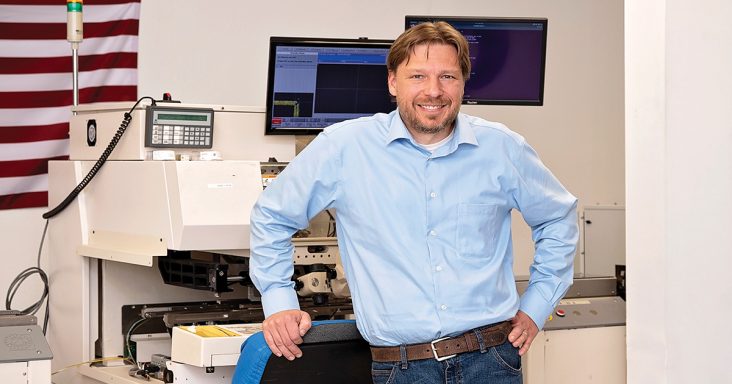Ozark IC to start clean energy project
by February 9, 2022 9:26 am 682 views

Matt Francis founded Ozark Integrated Circuits on Feb. 24, 2011. He earned a doctorate in electrical engineering from the University of Arkansas in 2009.
Fayetteville-based electronics manufacturer Ozark Integrated Circuits (Ozark IC) recently was awarded nearly $200,000 as part of a $35 million clean energy initiative of the U.S. Department of Energy.
The $199,935 is a fiscal 2022 Phase I award from the Small Business Innovation Research program and will be used to design and develop electronics to monitor next-generation nuclear reactors that use molten salt technology.
Matt Francis, CEO of Ozark IC, said the company has been working in clean energy for a while. In May 2020, the company received $206,000 for a related project.
Francis said conventional nuclear reactors use water for cooling, but those using molten salt can be more compact and might replace gas-fired plants. He noted that molten salt has a melting point of about 500 degrees Celsius and heats to nearly 700 degrees Celsius during the nuclear reaction.
“That’s very hot,” Francis said. “That’s a good fit for what we develop – the extreme-environment electronics and single-board computers. What they need from us to make these reactors a reality is the ability to monitor that coolant of the salt as it ages.”
Ozark IC will develop the sensors that go into the corrosive environment the salts create and the health monitoring instrument. The company is working on the project with University of Wisconsin professor Mark Anderson, a scholar on molten salt reactors.
The first phase is 12 months, and the company will submit a proposal for the next phase nine months after work starts. It will learn whether it’s been accepted into the next phase in about a year.
Phase one will include a feasibility study and the development of sensors to prove the concept, and the second phase would be to scale it to the entire instrument system, Francis said.
“By the end of phase two, we would want to test it with a real reactor,” he said. “In phase one, we’re using Wisconsin’s molten salt simulations that they can do.”
Jim Holmes, chief scientist at Ozark IC, is leading the project. Between five and 10 employees are expected to work on the first phase.
